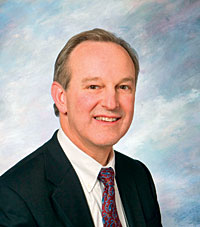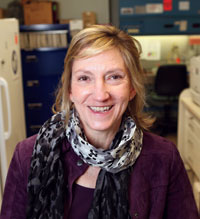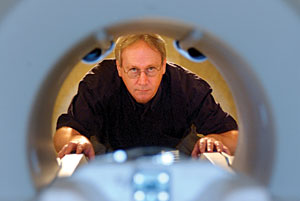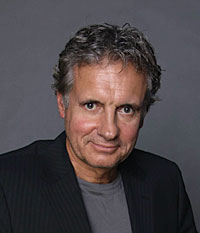Quick Takes
News From Around the Cancer Center
June 22, 2011
Neuss Named Chief Medical Officer
Michael Neuss, M.D., has been appointed chief medical officer for Vanderbilt-Ingram Cancer Center’s clinical enterprise. He assumes the newly created position July 1.
A Duke-trained oncologist in practice since 1986, Neuss was, until December, the vice president of the largest oncology practice in the Cincinnati area.

Michael Neuss, M.D.
Neuss will report to C. Wright Pinson, MBA, M.D., deputy vice chancellor for Health Affairs and senior associate dean for Clinical Affairs at Vanderbilt University Medical Center, and Jennifer Pietenpol, Ph.D., director of the Cancer Center. He will also hold a faculty position as professor in the Department of Medicine’s Division of Hematology/Oncology.
“In the face of health care reform, demonstrating value and outcomes will be an increasingly important aspect of what we deliver to our patients, referring providers and payers,” Pinson said. “Michael’s leadership, focus and experience will be critical as we move forward.”
Creation of this new role is vital to Vanderbilt’s ability to meet the demands for oncology care in the face of an aging population (average onset of cancer is age 67), a forecasted shortage of oncologists and increasing financial constraints.
“Michael will fill an important niche in providing physician leadership across the cancer clinical enterprise, which involves virtually every clinical department and division at the Medical Center,” Pietenpol said. “In collaboration with his physician colleagues, Michael will develop strategies to assure clinical growth, on campus and in community settings.”
Neuss completed his medical degree, post-graduate and fellowship training at Duke University School of Medicine. In 1986, he joined Oncology/Hematology Care Inc. as its second physician. The practice now includes 48 oncology specialists, 300 non-physician employees and a $200 million budget, with 15 locations in Ohio, Kentucky and Indiana. He has led technology and quality initiatives at each location.
Nationally, Neuss has been involved in quality initiatives of the American Society of Clinical Oncology as well as an American Board of Medical Specialties project to define oncology episodes and a national panel defining quality oncology services for payers.
“Breakthroughs in the care of patients with cancer will be possible only through the coordinated efforts of people working together,” Neuss said, noting that the collegial environment for which Vanderbilt is known was a major attraction for him.
“All the pieces necessary – the knowledge base, informatics tools, technical skill and caring of providers – really seem to be present in the Cancer Center. It is a great honor to join this team.”
– by Cynthia Manley
VICC Launches Genetic Research Tool
Vanderbilt-Ingram Cancer Center has launched the nation’s first personalized cancer decision support tool, “My Cancer Genome,” to help physicians and researchers track the latest developments in personalized cancer medicine and find clinical research trials for their patients.
This Web-based information tool (www.MyCancerGenome.org) is designed to quickly educate clinicians on the rapidly expanding list of genetic mutations that impact different cancers and, at the same time, enable them to more easily research various treatment options based on specific mutations.
The tool is the latest addition to Vanderbilt-Ingram’s Personalized Cancer Medicine Initiative.
“Staying abreast of these fast-paced research changes may be difficult for time-pressed oncologists and medical caregivers. We launched this Web-based tool to enable a genetically informed approach to cancer medicine that we believe can be more efficient and effective,” said William Pao, M.D., Ph.D., associate professor of Medicine and director of Personalized Cancer Medicine at Vanderbilt-Ingram.
With just a few clicks, users can get up-to-date information on the clinical significance of specific mutations.
“We designed this online tool to be comprehensive, scalable and easy for clinicians to use,” said Mia Levy, M.D., Ph.D., assistant professor of Biomedical Informatics and Medicine and Cancer Clinical Informatics Officer for Vanderbilt-Ingram.
The tool is linked to Vanderbilt University Medical Center’s StarPanel electronic medical record database.
“Once we test a patient’s tumor for specific mutations, the test results stay in a patient’s medical record, so as new treatment options become available for each mutation, our physicians will have that information at their fingertips,” Levy said.
The online tool currently features information on lung cancer and melanoma, with plans to add content on breast, colon and other cancers soon.
– by Dagny Stuart
Online Community Connects Patients, Caregivers
Vanderbilt-Ingram Cancer Center has joined with the national CancerConnect.com initiative to launch a new online support community for people impacted by cancer, including patients, family members, friends and advocates.
Participants don’t have to be a Vanderbilt-Ingram patient or family member to join. Members can share stories, ask questions and learn from the experiences of others in communities of patients and caregivers from across the country, specific to their disease type and/or issues of concern.
Vanderbilt-Ingram physicians and other experts will occasionally serve as guest moderators and hosts on topics of interest to the cancer community.
For more information, visit: cancerconnect.com/vanderbilt
Zutter Leads Integrative Diagnostic Testing
Mary Zutter, M.D., has been appointed assistant vice chancellor for Integrative Diagnostics at Vanderbilt University Medical Center.
In her newly created role, she will guide efforts to correlate and integrate diagnostic test results in an easily accessible way, to help clinicians make quick and accurate diagnoses, determine the most appropriate therapy and avoid unnecessary and costly tests.
The new position is designed to optimize the process of “bringing personalized medicine into reality,” said Gordon Bernard, M.D., associate vice chancellor for Research who will oversee the effort.

Mary Zutter, M.D.
Zutter, who will continue to direct the Division of Hematopathology, said “integrative diagnostics” emerged from discussions she had last year with Jeff Balser, M.D., Ph.D., vice chancellor for Health Affairs and dean of Vanderbilt University School of Medicine.
At the time, she was leading development of a “diagnostic management team” (DMT) in Hematology/Oncology to guide clinical decision-making in diagnosing and treating leukemias and lymphomas.
With the help of Bill Stead, M.D., the Medical Center’s Chief Strategy and Information Officer, and Mia Levy, M.D., Ph.D., assistant professor of Biomedical Informatics, Zutter’s team developed a computerized “dashboard” and patient “flow chart” to keep track of the tests used in diagnosis and monitoring treatment and have begun to issue comprehensive hematopathology reports. The program launched Feb. 14.
“When a patient comes into the clinic, all the data are there to understand patient history and laboratory tests and to direct ordering of additional ancillary tests,” said Zutter, who also has been named to the newly created Louise B. McGavock Chair.
The comprehensive, electronic patient reports generated by the DMT link to up-to-date references and appropriate clinical trials.
“While we are convinced that this is the right thing to do and the best thing to do for patient care,” Zutter continued, “it will also be cost effective. If we can work out the very best way to diagnose and monitor patients with these difficult diseases, this would be valuable not only to Vanderbilt but to the rest of the country … That I find really exciting.”
– by Bill Snyder
Grants Fund Research on Early Detection
The National Cancer Institute has awarded two Early Detection Research Network (EDRN) grants to Vanderbilt-Ingram Cancer Center investigators to support early detection of lung and colon cancers.
Pierre Massion, M.D., associate professor of Medicine and Cancer Biology, has been awarded $3 million over five years for the creation of the Vanderbilt Clinical Validation Center.
Daniel Liebler, Ph.D., Ingram Professor of Cancer Research and professor of Biochemistry, Pharmacology and Biomedical Informatics, and David Tabb, Ph.D., assistant professor of Biomedical Informatics and Biochemistry, have been awarded $3 million over five years for the creation of the Vanderbilt Biomarker Development Laboratory (BDL), which will be established within the Jim Ayers Institute for Precancer Detection and Diagnosis.
Massion and colleagues will recruit Nashville-area patients at high risk for lung cancer and will evaluate biomarkers in blood, urine or tissue samples to determine whether the molecular signatures are helpful in early diagnosis of lung cancer.
“If we can find the patients with the highest risk of disease, we have an opportunity to detect the disease before it is symptomatic and give those patients a chance for a cure,” said Massion.
Liebler and Tabb will develop and apply new proteomics methods and informatics tools to identify proteins that may be useful as biomarkers for lung and colon cancer.
“We have developed a state-of-the-art pipeline at Vanderbilt for identifying protein modifications,” said Tabb. “Through EDRN, those tools will gain a much broader impact.”
“We are unique among the EDRN network programs in our ability to identify new biomarker candidate molecules,” Liebler said.
“We are ideally positioned to advance the science of early detection in both colon and lung cancer.”
– by Dagny Stuart
Gore Elected to Engineering Academy
John Gore, Ph.D., director of the Vanderbilt University Institute of Imaging Science and Vanderbilt-Ingram Cancer Center member, has been elected as a member of the National Academy of Engineering.

John Gore, Ph.D., was recently elected to the National Academy of Engineering. (Photo by Dana Johnson)
Cited for his contributions to “the development and applications of magnetic resonance and other imaging techniques in medicine,” Gore joins a select group of 2,290 U.S. scientists and 202 foreign associates. He is the third Vanderbilt faculty member to be elected to the academy.
His research interests include development of methods for studying human brain structure and function using ultra-high field MRI, combining information from different imaging techniques to study small animals, including mouse models of human cancer, and developing new imaging applications.
“John is an internationally renowned expert in imaging technology and a pioneer in magnetic resonance imaging and spectroscopy techniques,” said Kenneth Galloway, Ph.D., dean of the Vanderbilt University School of Engineering. “He is at the forefront of several novel engineering solutions being developed to address the technical challenges of human imaging.”
Gore is the Hertha Ramsey Cress Professor of Medicine and professor of Radiology & Radiological Sciences, Biomedical Engineering, Molecular Physiology & Biophysics and Physics & Astronomy. He also is vice chair for Research in the Department of Radiology & Radiological Sciences.
– by Bill Snyder/Brenda Ellis/David Salisbury
Grant Bolsters Pancreatic Cancer Research
Stephen Fesik, Ph.D., professor of Biochemistry, Pharmacology and Chemistry, has received a $2.5 million grant to fund research on drugs to treat pancreatic cancer.

Stephen Fesik, Ph.D.
The three-year award from the Lustgarten Foundation will support Fesik’s work targeting K-Ras, a protein mutated in 90 percent of pancreatic cancer patients.
Approximately 43,140 patients were diagnosed with pancreatic cancer in the United States in 2010 with 36,800 deaths from the disease, according to the American Cancer Society. There are few treatment options for the disease.
“I am honored to receive this multi-year grant in support of our drug discovery research against this horrible disease,” said Fesik, who holds the Orrin H. Ingram II Chair in Cancer Research. “The grant will also allow us to be part of the Lustgarten Foundation’s consortium of outstanding researchers working together in the fight against pancreatic cancer.”
The Lustgarten Foundation is a nonprofit organization dedicated to promoting research that will lead to a cure for pancreatic cancer. The Foundation was launched in 1999, inspired by Marc Lustgarten, vice chairman of Cablevision and chairman of Madison Square Garden in New York. Lustgarten, who served on the initial board of directors for the Foundation, died from pancreatic cancer at 52.
– by Dagny Stuart
Seven VU Faculty Honored
Seven Vanderbilt University faculty members, including six Vanderbilt-Ingram Cancer Center members, have been elected Fellows of the American Association for the Advancement of Science (AAAS), the world’s largest federation of scientists:
Stephen Fesik, Ph.D.
Cancer Center member
Alfred George Jr., M.D.
Cancer Center member
John Gore, Ph.D.
Cancer Center member
Jeffrey Johnston, Ph.D.
Michael Stone, Ph.D.
Cancer Center member
Susan Wente, Ph.D.
Cancer Center member
John Wikswo, Ph.D.
Cancer Center member
They are among 503 AAAS members from around the country who achieved this honor because of their distinguished efforts to advance science or its applications.
– by Leigh MacMillan
